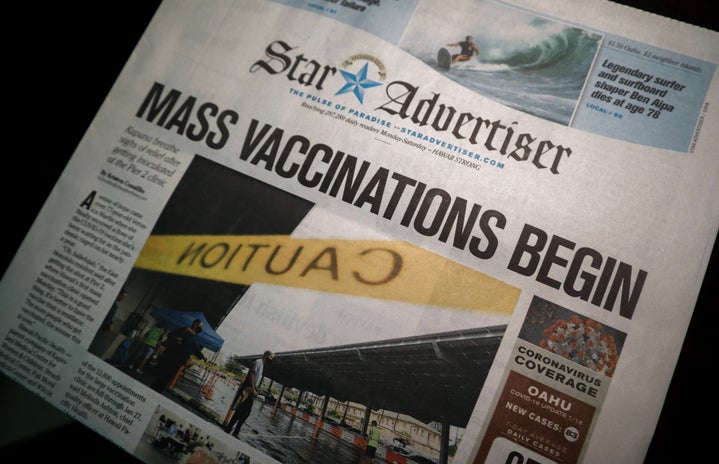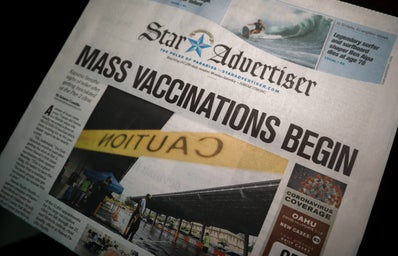Journalism is in a state of constant fluctuation. New digital platforms have unleashed unconventional journalistic practices that enable novel forms of communication and wide global reach than at any point in the span of human history. On the contrary, disinformation and hoaxes that are popularly referred to as “fake news” are accelerating and affecting the way individuals interpret their day to day livelihood and choices. Driven by politics, satirical radicalized ideas on social media, the proliferation of talk radio and cable news, many information systems have become more polarized and contentious, and there has been an immense decline in public trust in traditional journalism.
Arguably the current most topical debate across the nation has become Covid-19 vaccination. As of 2020, every individual’s life was impacted by the pandemic and required adjustment to what time and time again was referred to as the “new normal.” The psychological implications of the pandemic had deeper effects than we may ever realize but also resulted in hesitancy towards the healthcare system. Now, on the other side of it, with new and reportedly more harmful strains of Covid, the question becomes: Should I be vaccinated?
There has been much speculation about the development of the vaccine options, it’s long term and short term physiological effects, and even the far-reaching fear of being microchipped for tracking purposes. I interviewed Linda Lentz Hubert Assistant Professor of Public Health at Agnes Scott College, Dr. Erin Bradley (EB), who teaches epidemiology and biostatistics courses. In this article we address common questions surrounding the vaccine and discuss how to combat medical misinformation.
Covid-19 Vaccination Q&A
How do vaccines protect against disease?
“In the simplest terms, vaccines give your body a chance to practice defending itself against something that will make you sick (like viruses or bacteria) before you come into contact with the real thing. It gives your immune system a heads up so to speak: “‘If you ever encounter this, here is how to respond’” (EB).
Can the Covid-19 Vaccine give me Covid-19?
“I can understand why some people have this question, but no, it is completely impossible for the vaccines being used to give anyone Covid-19. The Pfizer, Moderna, and J&J vaccines, which are the ones authorized for use in the U.S., do not contain the virus. So, no, it isn’t possible” (EB).
Are the side effects of the vaccines normal?
“Much like any shot, your arm might be sore after you get the Covid-19 vaccine. It’s also possible to have symptoms like tiredness, headache, fever, or chills for up to 2 or 3 days. This is just a sign that your immune system has been activated. Remember, the vaccine gives your immune system a practice round to learn how to defend itself in case it encounters the real thing.
For ongoing safety monitoring, there is a reporting system called VAERS (vaccine adverse event reporting system) where anyone can report a negative response to the vaccine. People are also encouraged to use a smartphone tool called v-safe to quickly and easily report any side effects to CDC. This information is closely monitored and signals public health and medical experts to investigate if something happens that wasn’t expected at all (something new) or to that degree (far more severe, affects far more people). Trained public health and medical experts can identify what is normal/expected based on data collected for many years and what is unusual and needs special attention. We’ve seen a few instances already where there has been a pause to investigate a potential concern. This should foster confidence that safety is a priority and the monitoring system is useful” (EB).
What is the point of getting the Covid-19 Vaccine if it does not protect against the variants such as Delta?
“Great question. To be clear, the vaccines we have do provide high levels of protection against Delta and the other variants we’re tracking. One consideration is protection against infection. Another is protection from severe disease and hospitalization. Another is protection from death. When you think about it, we don’t want people to get infected, but if they do, we want to prevent them from getting really sick or dying. For all of these measures – infection, hospitalization, and death – unvaccinated people make up the vast majority of cases. So, it’s not hard at all to see that people who are fully vaccinated against Covid-19 are faring better. Now, no vaccine is 100% effective. Because of this, we have always known that a small percentage of vaccinated people will get infected, an even smaller group would have a severe case, and an even smaller group would unfortunately die. Although the Covid-19 vaccines are not perfect, they are still quite effective” (EB).
Why do I need to wear a mask if I’m vaccinated?
“The most common way to become infected is by breathing in the virus from the air (aerosols). Masks reduce the amount of virus an infected person breathes out into the air. Masks also filter or limit the amount of virus an uninfected person inhales. As I said earlier, no vaccine is 100% effective so wearing a mask over your nose and mouth can protect people who might become breakthrough cases. Also, considering the effectiveness of the vaccines in limiting COVID-19 severity, vaccinated people may not even know they are infected and accidentally spread the virus to others. So, if everyone wears a mask, regardless of vaccination status, we can reduce transmission by limiting the amount of virus lingering in the air. For the general public, KN95 or KF94 masks provide the most protection, followed by surgical masks, then fabric masks.
I know that some vaccinated people have been confused or even frustrated by changes, which is completely understandable! However, periodically updating guidelines to match the current science makes sure that people are only being asked to wear masks when it’s necessary” (EB).
What are the long term effects of the vaccine?
“It’s hard to draw long-term conclusions about anything related to a disease we’ve known about for less than two years. To date, researchers haven’t identified negative long-term effects of the Covid-19 vaccines. Public health reporting systems like VAERS and v-safe are in place for ongoing monitoring, and follow up with vaccine research participants will likely happen for years. Similar to short-term side effects, trained public health and medical experts are able to recognize when reports go beyond what we would normally expect to happen apart from vaccination” (EB).
Was the Covid vaccine developed too fast to be safe?
“Although the timeline was accelerated, none of the key steps in the clinical trial process were skipped. Instead, things that can normally slow down the process like getting someone to prioritize and fund the research, recruiting participants, and waiting in a long line of applicants for FDA review were not barriers because this was a global emergency. Also, vaccine developers did not start from scratch. The virus that causes Covid-19 is a part of a group of very similar viruses called coronaviruses. Researchers had already been working to develop vaccines for other types of coronaviruses. So, they had a head start because of previous vaccine research with similar viruses, highly trained and motivated scientists with abundant resources, and the ability to skip to the front of the line for expert review and authorization by the FDA. All of these factors helped speed up the process” (EB).
Medical Misinformation
In June 2020, The World Health Organization (WHO) began a webinar series on the infodemic, where medical researchers, social scientists, journalists, and health professionals discussed how misinformation impacts their ability to deliver timely, relevant, and local information. There is a broad need for a cross-sector alliance to damp the spread of health misinformation, but in this critical time, expertise is overwhelmed by the flood of misinformation, rumors, and conspiracies. Will there ever be enough good information to counterweight bad information? The pandemic has seen people increasingly turn to social media for information so the need to grow in health literacy has in turn become increasingly important in which the question becomes: What can be done systematically to solve this? 1) Creating and providing information and services people can understand and use most effectively with the skills they have. 2) Collaboration with educators and others to help people become more familiar with health information and services and build their health literacy skills over time. 3) Public Health and Medical Professionals building their own skills as communicators of health information.
Developing a culture of fact-checking information and growing in health literacy are key goals that should be fostered within the general public. Through this we may empower audiences to question the validity of health information shared in the media, including that of Covid-19 vaccination. Ultimately, the goal of public health is to prevent disease, promote health, and prolong life among the population as a whole. Click here if you would like to learn more about Covid-19 vaccination and if you would like to hear more from professors at Agnes Scott College click here. If you reside in the state of Georgia and would like to schedule an appointment to be vaccinated, click here.


